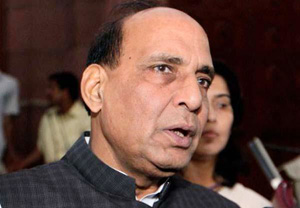Mumbai, Oct 21: The Bharatiya Janata Party appears in no hurry to form the next government in Maharashtra and the process may be initiated only early next week after the Diwali festival is over, party sources said here Tuesday.
Home Minister Rajnath Singh, who as and party observer was expected to arrive in Mumbai along with senior colleague J.P. Nadda to crown the next Maharashtra chief minister, postponed his visit Tuesday for the second time in a row and will now come down next week.
"I am not going today. I may go to Mumbai after Diwali," Rajnath Singh told media persons in New Delhi Tuesday, extending the nail-biting suspense in the state since the BJP emerged as the single-largest party in the 13th assembly elections but fell short of simple majority.
The state BJP - already assured of unconditional external support from the Nationalist Congress Party - has decided to continue its independent efforts to cobble up at least a minority government.
It has contacted over a dozen of the 18 Independents or newly-elected legislators from small and regional parties who have got single-digit representation in the new house.
Senior party leaders are claiming that with the support of these Independents and smaller or regional parties, the BJP could stake claim to form a minority government.
BJP sources also say that later, with the support of the NCP and the Bahujan Vikas Aghadi's three legislators, it would easily sail through the vote-of-confidence in the legislature.
On its part, the Shiv Sena has also adopted a 'wait-and-watch' attitude while expressing readiness to sit in the opposition if the BJP failed to come up with an acceptable proposal for alliance.
In the 288-member assembly, the BJP and allies secured 123 seats, the Shiv Sena got 63, Congress managed 42, the NCP won 41 and the remaining seats were bagged by either Independents or smaller and regional parties. A party needs 145 seats for simple majority in the state assembly.





Comments
Add new comment